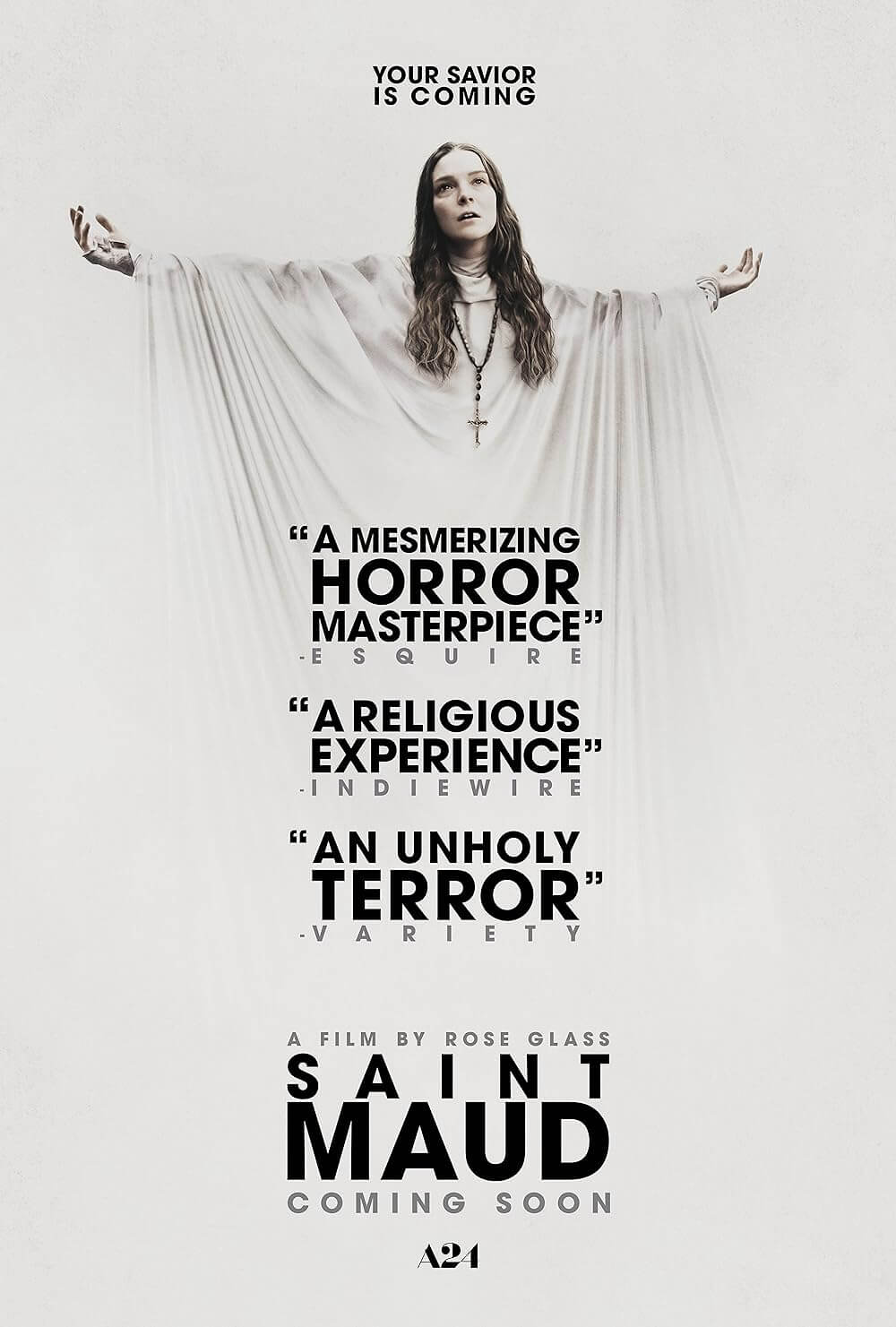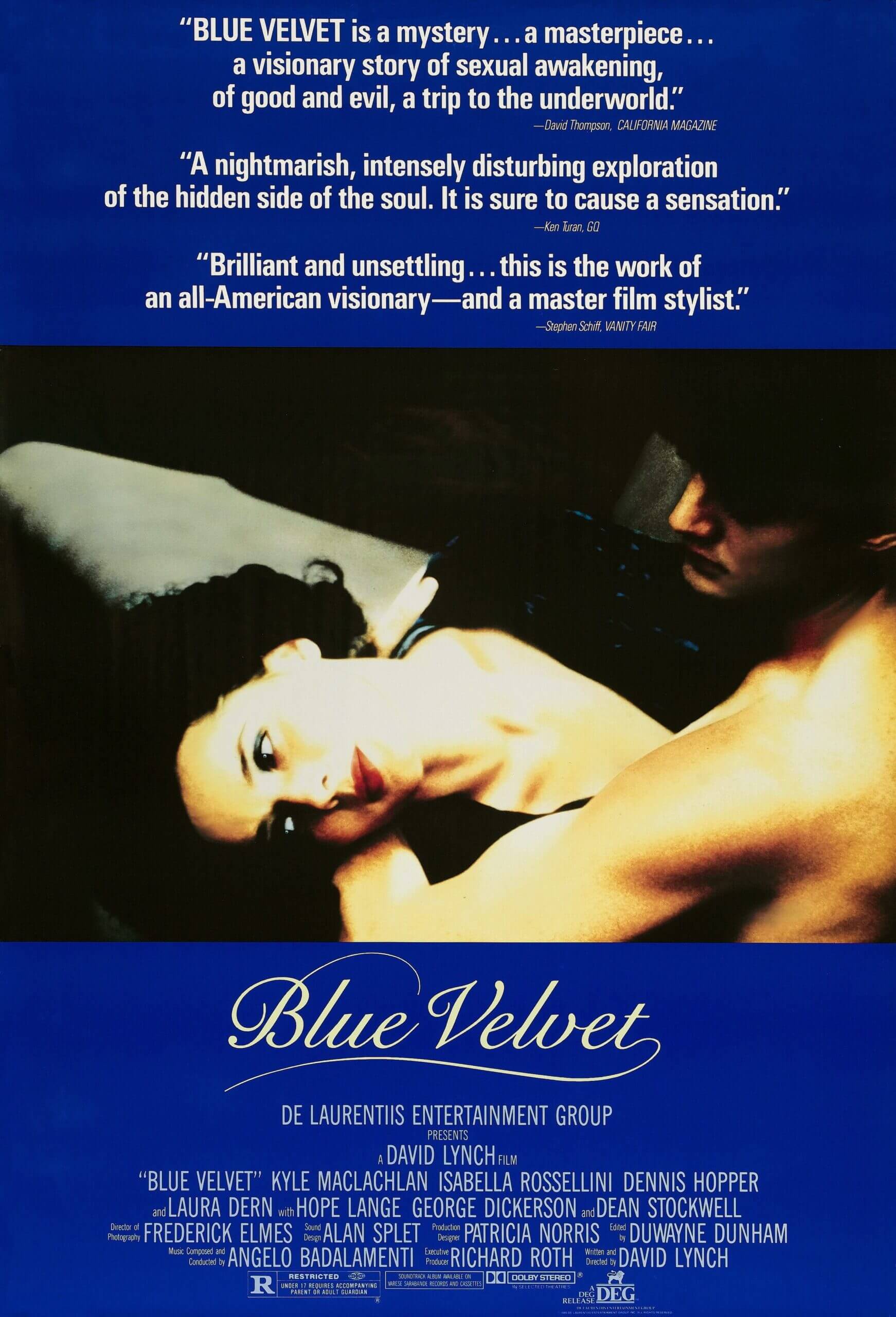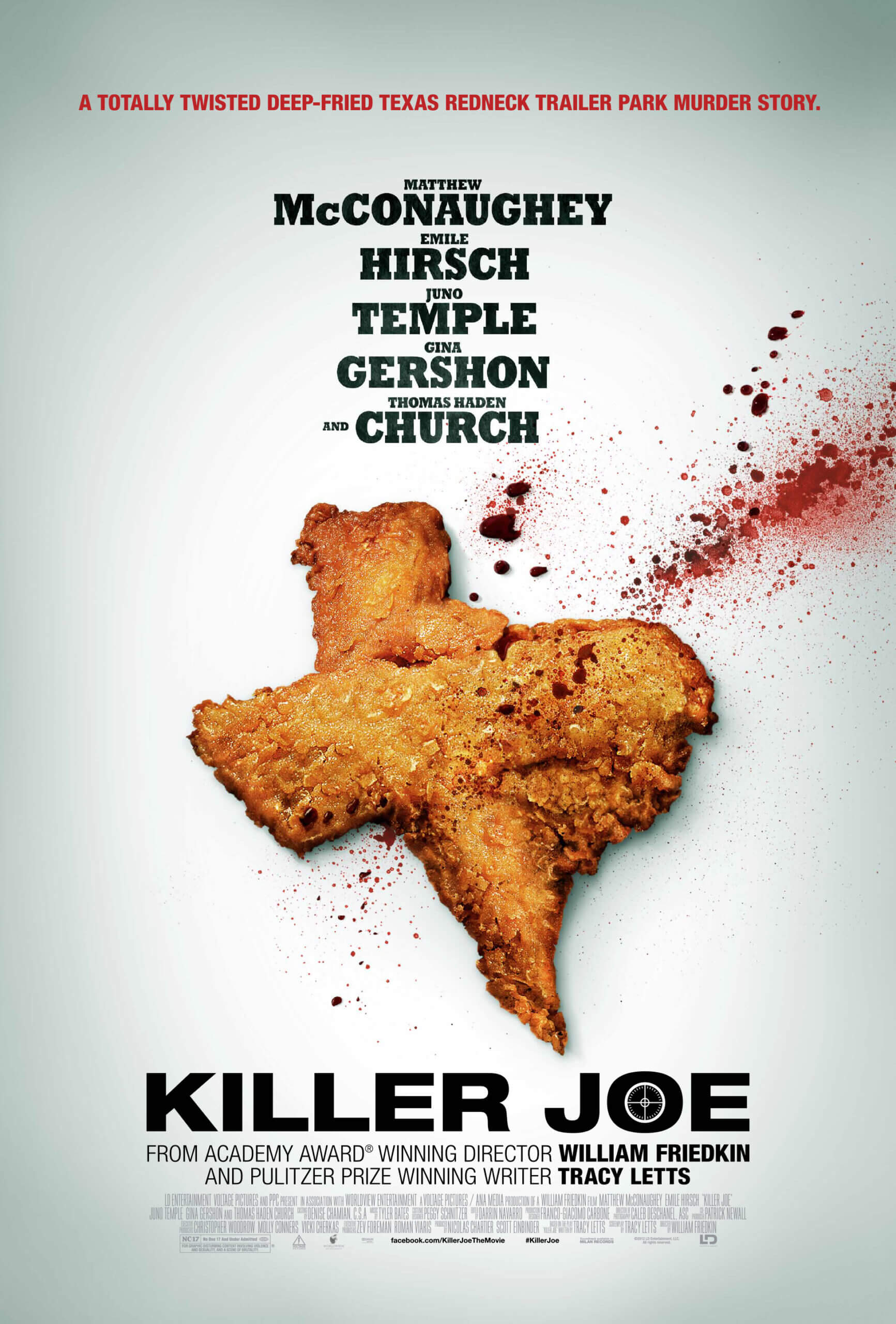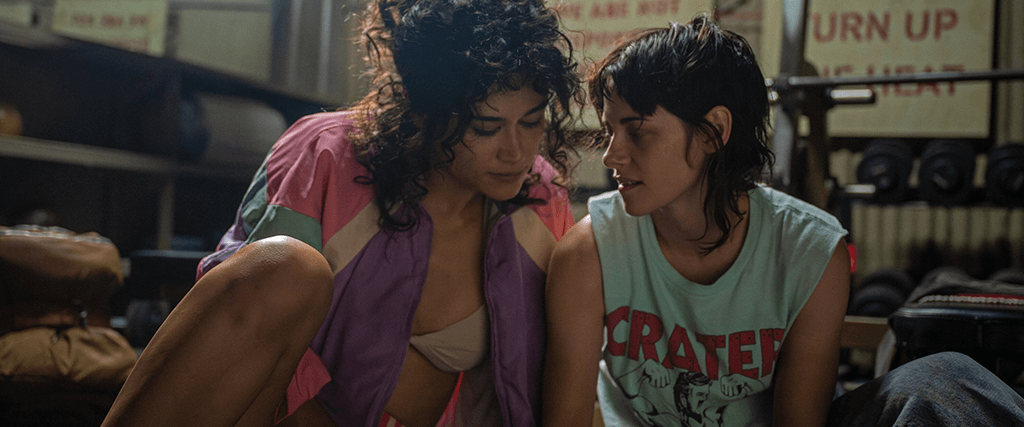
Love Lies Bleeding
By Brian Eggert |
Within an hour of their first encounter, drifting bodybuilder Jackie and lesbian gym employee Lou face a parking lot brawl, experiment with steroids, and have casual sex on a weight room floor, and things only get more intense from there. Love Lies Bleeding is the second film by British writer-director Rose Glass, and it’s the erotically charged, surreally demented, and slightly more upscale cousin of William Friedkin’s trailer-park noir, Killer Joe (2011), but it’s no less twisted and gleefully bizarre. With its first nightmarish red frames peering into a crevasse that descends into a hellscape, only to emerge on the other side in a dreamy, twinkling sky loaded with falling stars—a contrast worthy of Blue Velvet (1986), which isn’t the only time Glass evokes David Lynch—this lurid neo-noir plays like an increasingly hallucinatory and febrile look at the euphoria and delusions of love and lust. Headlined by Kristen Stewart and relative unknown Katy M. O’Brian, this potent and heady mix of queer romance, voracious sex, seedy crime, and body horror is told with disturbing and evocative imagery, yet with a kind of deranged sweetness that makes its leads strangely endearing.
Glass’ first feature, Saint Maud (2020), a cagey and haunting portrait of a Scarborough religious fanatic whose behavior, embodied by an excellent Morfydd Clark, has more in common with Travis Bickle than her self-proclaimed relationship with the almighty suggests, walked the line between madness and faith. For her second film, Glass and Weronika Tofilska’s screenplay goes in another direction entirely, on the surface anyway. The films have more in common than they might initially suggest, right down to an ending that projects a subjective vision onto the screen, resulting in some unforgettable imagery. But before that, her second film opens in New Mexico during the late 1980s, a decade where a fitness-obsessed culture produced muscular action heroes (Schwarzenegger, Stallone, Van Damme), sports icons on Wheaties boxes, and manipulative advertising that reinforced the illusion that glistening muscles meant success and economic prosperity. The film’s era of choice is also when seeing a bodybuilder in Zubas and a fanny pack wasn’t an anachronism but an inevitability, presenting a darkly humorous bent to the otherwise pulpy scenario.
The first shots of Love Lies Bleeding float into Crater Gym, a crummy spot where Glass shoots the bodies of workout warriors in a similar way that Julia Ducournau filmed automobiles and strippers in Titane (2021)—with extreme, dripping close-ups. The skinny gym worker Lou (Stewart) doesn’t partake; instead, she’s first shown clearing a blocked toilet, establishing that Glass isn’t one to look away from anything. But when Jackie (O’Brian) enters the gym, Lou can’t take her eyes off her, and it doesn’t take long for them to hook up. Traveling from Oklahoma to Las Vegas to perform in a bodybuilding competition, Jackie has no place to stay, and this small town is just another stop where she can earn a few bucks to get her further down the road. She already landed a job waitressing at a bar on a gun range owned by Lou’s father, Lou Sr. (Ed Harris), whose bug-obsessed weirdness shouldn’t distract from his deadly underground business, shipping guns across the Mexican border. Unfortunately, Jackie had to screw the mulleted JJ (Dave Franco), Lou’s brother-in-law, a philanderous bastard who beats his wife, Beth (Jena Malone), to get the job.
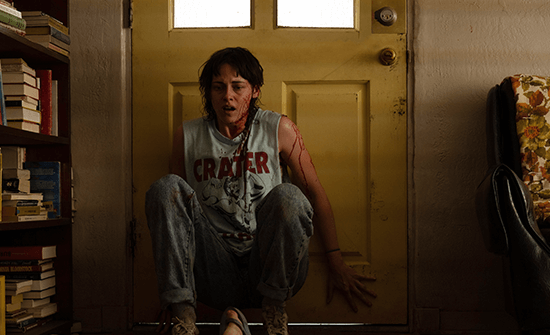
Jackie’s floundering until this point seems to stop with Lou, as the two share a genuine passion for each other. Lou supplies Jackie, who’s otherwise au naturel, with a box of steroids, which she uses to get even more jacked in workout scenes that show her muscles growing beneath the skin with impossible speed, her veins bulging with uncanny ferocity. But Jackie isn’t accustomed to the other side effect—namely, roid rage. Her strength and dizzying bouts of intensity get the couple into trouble, requiring them to cover up a nasty murder scene resulting from Jackie’s killer instincts. From here, Lou sees it as a chance to expose her father, whose criminal activities have darkened her past. Before long, the two must navigate several threats, from the FBI snooping around to the frightening presence of Lou’s monstrous, comically long-haired and eccentric father, with Harris radiating insidious danger, appearances notwithstanding. The situation tests their companionship, especially after Lou must manage a potential witness, the clingy Daisy (Anna Baryshnikov), whose yellow-orange teeth always look like she just finished a bag of Cheetos.
Shooting on location in New Mexico, Glass saturates her film’s world with sweat and grime, hinted in Lou’s greasy hair and the cheap period garb selected by costume designer Olga Mill. Glass and production designer Katie Hickman create a general atmosphere of a sordid neo-noir such as Blood Simple (1986), combined with a Western. In those terms, maybe Jackie is like an anti-hero from an Anthony Mann film such as The Naked Spur (1953), whose protagonist has a rage inside him waiting to explode, just as Jackie does. But this world isn’t so grungy as to warrant only revulsion. There’s a certain unshowered allure to Glass’ central characters, unlike those in Killer Joe. It’s easy to get swept up in Lou and Jackie’s romance, with their raw physicality producing several uninhibited sex scenes. Still, questions linger about Jackie’s home life, into which we get only a brief glimpse with a phone call home. Glass explores Lou more, particularly through her choice to stay in this crummy New Mexico town to watch over her sister, Beth, from the abusive JJ. After one incident that leaves half of Beth’s face resembling the Lady in the Radiator from Lynch’s Eraserhead (1977), she refuses to press charges, and her father won’t even take criminal action because it’s against Beth’s wishes. Incidents like this twist Lou into knots.
Accented by Clint Mansell’s enveloping electronic score and a soundtrack of underground music, the film alternates between dingy settings that feel grounded in reality and more out-there flourishes rooted in the characters’ personal viewpoints. The most apparent of these touches are a scene that finds Jackie under the influence of steroids, her body charged from workouts and sex, morphing with Incredible Hulk-like intensity, and the wonderfully unpredictable finale, which might lose a whole section of the audience. So when Jackie pumps herself up to signs reading, “The body achieves what the mind believes” and “Destiny is a decision,” it’s not without intention. Glass conveys Jackie’s roided-out hallucinations—complete with scrambled audio, trippy imagery, and one visual that evokes an oral excretion vaguely reminiscent of Alex Garland’s Men (2022)—with manic energy, evidenced in O’Brian’s terror-tinged smile when she performs in Vegas. For her part, O’Brian, who has mostly played zombie apocalypse survivors and larger-than-life intergalactic heroes given her physique, shows incredible range and physical control in her reactive character.
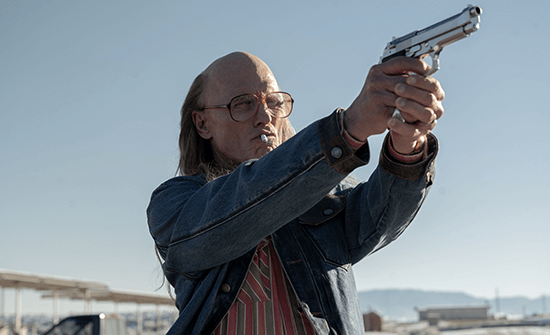
The acting in Love Lies Bleeding is superb, with Stewart offering an exposed-nerve performance as Lou. Stewart’s manner of uneasiness serves the character well, as Lou feels held back by her family and town, reeling like a trapped animal. But Glass has more on her mind than turning Lou into a victim of her family, from her father’s criminality to her sister’s entrenched battered woman syndrome. In the same way that Saint Maud submerged the viewer into the mind of a woman whose extreme loneliness amplifies her faith, Lou’s passion for Jackie makes her blind to her own hypocrisy. To be sure, Lou fails to recognize how much she’s like her father and sister, how she uses violence to solve her problems, or how she makes excuses for Jackie’s brutal outbursts, just as Beth does for JJ’s abuses. But it’s not just Stewart and O’Brian giving terrific performances. In the supporting roles, Harris hasn’t been so frightening since A History of Violence (2005), Franco has never played such a convincing sleaze, and Malone occupies the frazzled ‘80s mom mode usually associated with Dee Wallace. They shed any sign of their identities and commit fully to their roles, bringing an authentic texture to every scene.
In just two films, Glass has carved out a distinct style, authorial voice, and set of preoccupations, where her characters transform themselves according to their passions, and her aesthetic reflects their respective worlds. Saint Maud and now Love Lies Bleeding are about people who commit to their feelings, which Glass expresses in brief, outlandish, yet also curiously sensitive glimpses of the impossible, achieving a sudden emotional reaction from a jarring image beyond the ordinary. For some, these surreal moments will go too far, bordering on laughable. For others, it will be a tender visual expression. Others still will be baffled. No matter the reaction, Love Lies Bleeding isn’t the kind of film that someone can watch passively; it’s too wild and defiant for that. Even though Glass clearly has the cinema of Lynch, the Coen brothers, David Cronenberg, and Julia Ducournau on her mind, her sophomore effort feels brazenly unique. It’s the kind of movie that’s too weird and involving to dismiss, satisfying an urgent hunger for original cinema, and announcing Glass as a confirmed auteur whose next film cannot come soon enough.
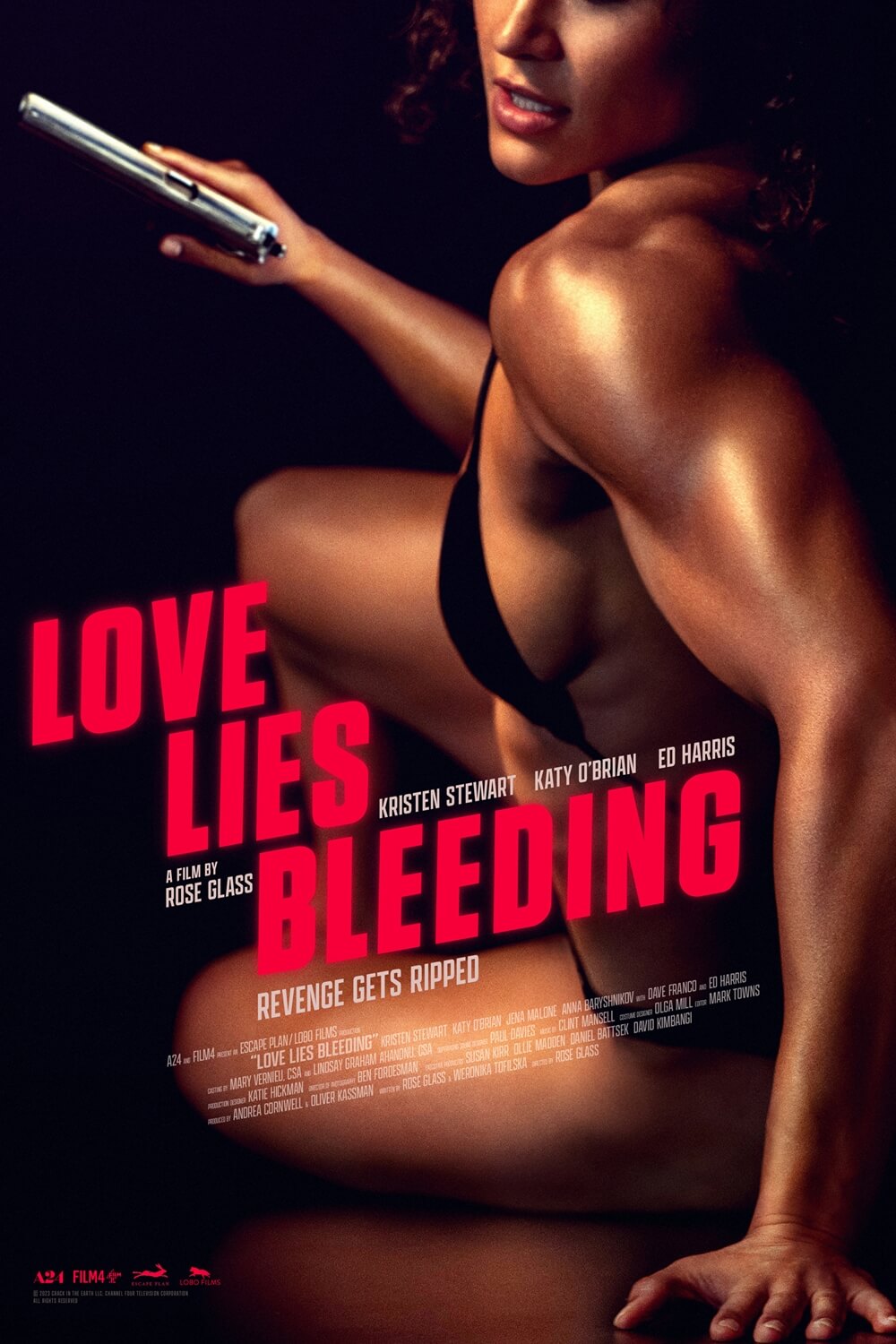
Unlock More from Deep Focus Review
To keep Deep Focus Review independent, I rely on the generous support of readers like you. By joining our Patreon community or making a one-time donation, you’ll help cover site maintenance and research materials so I can focus on creating more movie reviews and critical analysis. Patrons receive early access to reviews and essays, plus a closer connection to a community of fellow film lovers. If you value my work, please consider supporting DFR on Patreon or show your support in other ways.
Thank you for your readership!
Brian Eggert | Critic, Founder
Deep Focus Review


